Local
D.C. requires insurers to cover gender reassignment
Mayor bans insurance discrimination against trans residents
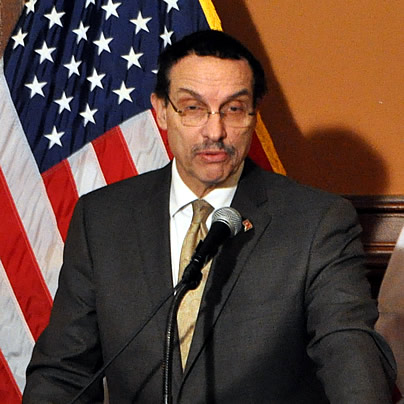
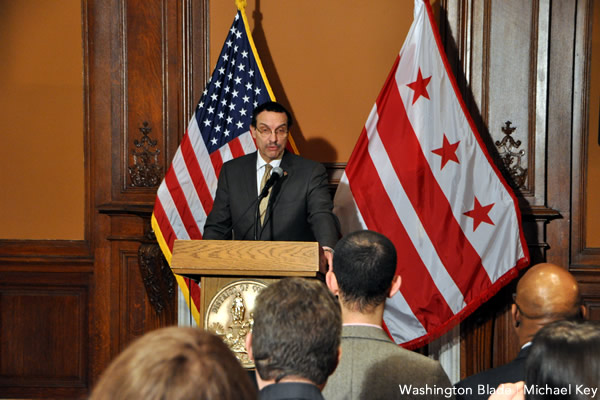
‘Treatment of individuals diagnosed with gender dysphoria is a covered benefit in all individual and group insurance plans in the District of Columbia, including Medicaid,’ said Mayor Vincent Gray. (Washington Blade photo by Michael Key)
D.C. Mayor Vincent Gray announced on Thursday that health insurance companies doing business in the District must provide full coverage for medically recognized treatments to help transgender people change their gender, including gender reassignment surgery.
At a news conference in a meeting room outside his office, Gray said the city’s Department of Insurance, Securities, and Banking issued a bulletin directing insurers to recognize a condition known as gender dysphoria, or gender identity disorder, as a medical condition to be covered by insurance plans.
Transgender advocates note that the American Medical Association and the American Psychiatric Association recognize gender dysphoria as a diagnosable condition through which physicians and other health care professional provide a wide range of approved medical treatments to assist people in transitioning from one gender to another.
“Today, the District takes a major step toward leveling the playing field for individuals diagnosed with gender dysphoria,” Gray said. “These residents should not have to pay exorbitant out-of-pocket expenses for medically necessary treatment when those without gender dysphoria do not,” he said.
“I’m clarifying today that treatment of individuals diagnosed with gender dysphoria is a covered benefit in all individual and group insurance plans in the District of Columbia, including Medicaid,” Gray said.
Gray’s remark drew a prolonged, standing ovation from LGBT activists, including transgender advocates, who gathered in the mayor’s ceremonial bill-signing room where Gray held his news conference.
“Those who know me know how proud I am that the District continues to be on the cutting edge and on the forefront when it relates to equality and fairness for its LGBTQ residents,” Gray said.
The bulletin, which the city sent to insurance companies on the day of Gray’s announcement, cites the D.C. Human Rights Act as among the legal grounds being used to require insurers to cover transgender related treatments. The Human Rights Act, among other categories, bans discrimination based on gender identity and expression as well as sexual orientation.
The bulletin cites the D.C. Unfair Insurance Trade Practices Act of 2001 as further grounds for not allowing insurers to exclude coverage of trans-related treatments from their insurance plans.
Among those speaking at the news conference was Mara Keisling, executive director of the D.C.-based National Center for Transgender Equality, which worked with the mayor’s office and insurance department officials to help draft the four-page bulletin.
Keisling said Gray’s action places D.C. among just five states that have adopted similar policies requiring insurers to cover treatments such as gender reassignment surgery and hormone therapy to assist an individual’s transition to another gender.
Those states are California, Oregon, Colorado, Vermont and Connecticut.
“This is really significant,” Keisling told the Blade after the news conference. “It means that transgender people in D.C. now can make their health care decisions with their doctor rather than with their insurance companies,” she said.
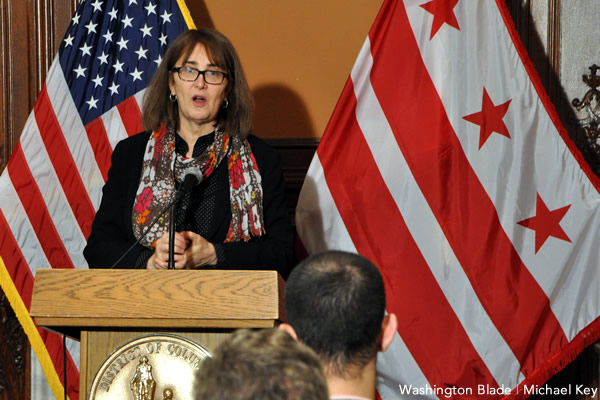
Mara Keisling, executive director of the National Center for Transgender Equality. (Washington Blade photo by Michael Key)
Asked what treatments are involved in a gender transition, Keisling said experts with the World Professional Association for Transgender Health Standards of Care (WPATH) have developed a wide range of treatments that may vary from person to person depending on individual needs.
“It’s a whole range of transition-related care — everything from diagnostic visits to experts in the field,” Keisling said. “It can mean hormone treatments. It can mean lab tests to make sure your hormones are working correctly and not causing any harm. There are various kinds of surgeries that transgender people may need. So it covers a whole range of things.”
D.C. transgender activist Andy Bowen, who recently joined the staff of the NCTE as a policy associate, called the D.C. initiative announced by Gray the most comprehensive among the states that have adopted similar policies.
“If you look at some of the other states they say they’re not going to cover some treatments,” Bowen said. “D.C. has not done that. It just said that if it’s one of the WPATH treatments we’re going to cover it. And that’s amazing to hear a government be that unequivocal about it.”
Philip Barlow, the city’s Associate Commissioner of Insurance, said after the news conference that requiring health insurance companies to cover the medical treatments for transgender people would likely result in a small increase in premiums over a period of time.
“It will just be incorporated into the general cost and utilization that insurers use in coming up with future rate increases,” he said. “But we don’t really anticipate it to have a significant impact on the rates.”
Michael Silverman, executive director of the New York-based Transgender Legal Defense and Education Fund, praised Gray for taking action that he said would “end health care discrimination against transgender residents of Washington, D.C.”
The bulletin issued by the city’s Department of Insurance that directs insurers to provide full coverage for medically approved treatments to transgender individuals in D.C. can be obtained here.
District of Columbia
Taste of Point returns at critical time for queer students
BIPOC scholar to speak at Room & Board event on May 2

The Point Foundation will kick off May with its annual Taste of Point DC event. The event will be hosted at Room & Board on 14th Street and feature a silent auction, food tastings, a speech from a scholar, and more.
Point’s chief of staff, Kevin Wright, said that at Taste of Point, the scholars are the star of the show.
“People never come to an event to hear Point staff speak, they come to hear from the people most impacted by the program,” he said. “At its core Taste of Point is designed to center and highlight our scholars’ voices and experiences.”
This year, a Point BIPOC Scholar, Katherine Guerrero Rivera will speak at the event.
“It is a great opportunity to highlight the scholars out there on the front lines making impacts in almost every sector and job field,” Wright said.
Wright pointed out that this year especially is a pivotal time for LGBTQ students.
“In 2023, there were 20 states that passed anti-LGBTQ legislation,” he said. “By this point in [2024] we already have more.”
Wright said the impacts of those legislative attacks are far reaching and that Point is continuously monitoring the impact they have on students on the ground.
Last month, The Washington Post reported that states with anti-LGBTQ laws in place saw school hate crimes quadruple. This report came a month after a non-binary student, Nex Bennedict, died after being attacked at school.
“So, we see this as a critical moment to really step up and help students who are facing these challenges on their campus,” Wright said. “Our mission is to continue to empower our scholars to achieve their full academic and leadership potential.”
This year Point awarded nearly 600 LGBTQ students with scholarships. These include the flagship scholarship, community college scholarship and the BIPOC scholarship. When the foundation started in 2002, there were only eight scholarships awarded.
Dr. Harjant Gill is one of those scholars who said the scholarship was pivotal for him. Gill said he spent his undergraduate years creating films and doing activism for the LGBTQ community.
As a result, his academic record wasn’t stellar and although he was admitted into American University’s graduate program he had no clue how he would fund it.
Upon arrival to American he was told to apply for a Point scholarship and the rest was history.
“It ended up being the one thing that kept me going otherwise I would have dropped out,” he said. “Point was incredibly instrumental in my journey to becoming an academic and a professor.”
More than a decade later, Gill serves on the host committee for Taste of Point and is a mentor to young Point scholars. He said that he donates money yearly to Point and that when he is asked what he wants for a gift he will often tell his friends to donate too.
To attend the event on Wednesday, May 2, purchase tickets at the Point website. If you can’t attend this year’s Taste of Point DC event but would like to get involved, you can also donate online.
District of Columbia
Three of five LGBTQ candidates win race for DNC delegate from D.C.
32 candidates competed for 13 elected seats in party caucus
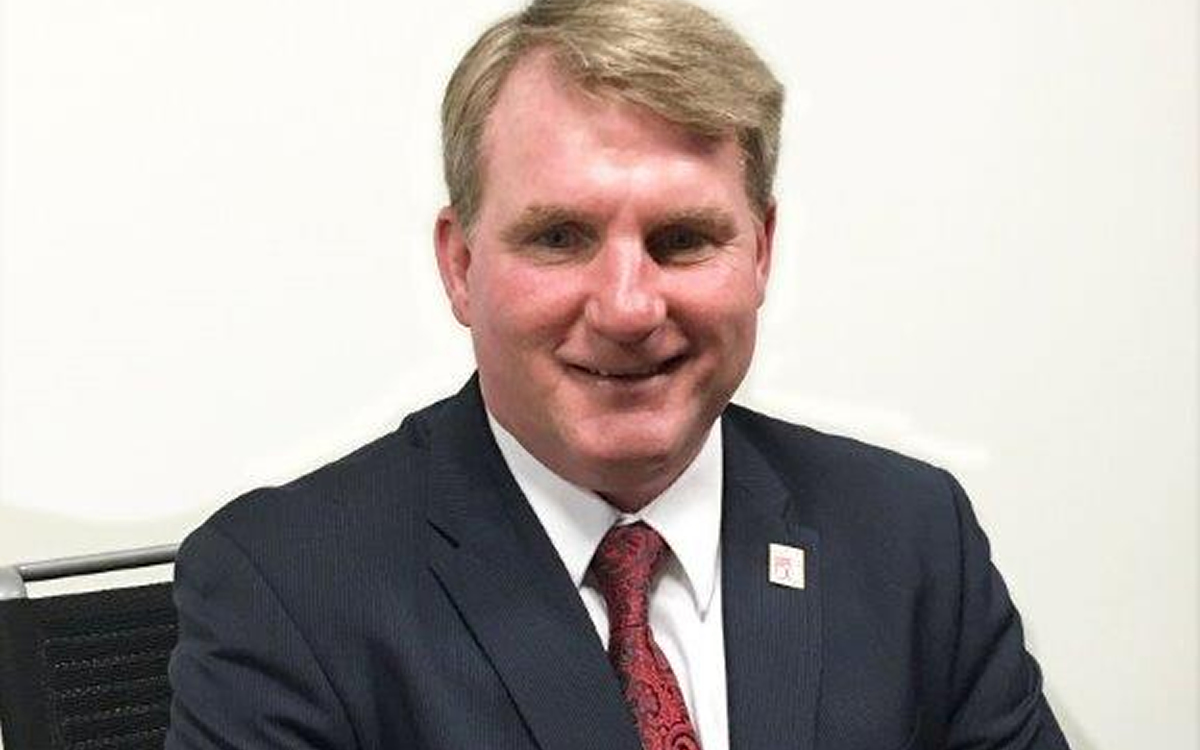
Three out of five known LGBTQ candidates running for election as delegates from D.C. to the Democratic National Convention won their races at an April 20 Democratic Party caucus election held at D.C.’s Walter Washington Convention Center.
Ward 2 gay Democratic activist John Fanning finished in first place with 140 votes and Ward 8 gay Democratic activist David Meadows finished in second place with 127 votes in a race in which six male candidates committed to supporting President Biden were competing for three male seats in a section of the city designated as Congressional District 1, which included registered Democratic voters in Wards 1, 2, 6, and 8.
Ward 7 gay Democratic activist Jimmie Williams won his race, finishing in third place with 200 votes in a race in which eight male candidates committed to President Biden competed for four male seats in the Congressional District 2 section of the city that included Wards 3, 4, 5, and 7.
Gay Democratic activist Felipe Afanador lost his race, finishing in sixth place with 47 votes in the Congressional District 2 election for male candidates backing Biden. It couldn’t immediately be determined which of the four wards in District 2 he is from.
The Washington Blade didn’t learn about Afanador’s status as an LGBTQ candidate until the Capital Stonewall Democrats announced it one day before the April 20 party election in an email statement.
In the Congressional District 2 race among female candidates, in which eight candidates competed for three female seats, transgender rights advocate and Ward 3 Democratic Party activist Monika Nemeth lost her race, finishing in sixth place with 49 votes.
The five LGBTQ candidates were among 32 candidates competing for just 13 elected delegate positions in D.C. D.C. will have a total of 51 delegates to the Democratic Convention, but the other 38 include elected officials and party leaders who are considered “automatic” or appointed delegates. The Democratic Convention will be held in Chicago Aug. 19-23.
Observers familiar with the April 20 party caucus election said Fanning, Meadows, and Williams had participated in local D.C. Democratic Party events and activities for a longer period than Nemeth and Afanador and appear to have been better known among Democratic voters in their respective wards as well as other wards. Those factors contributed to their receiving significantly more votes than most other candidates, observers have said.
In his candidacy statement posted on the D.C. Democratic Party website, Afanador said he worked on the 2020 Biden presidential election campaign in Pennsylvania. His LinkedIn page says in 2022 he began work in Washington for the Biden administration as an official in the U.S. Department of Agriculture.
Nemeth is a past president of D.C.’s Capital Stonewall Democrats, the city’s largest LGBTQ local political group, and has been an active member of the D.C. Democratic State Committee, the local party governing body. She served as a Biden delegate at the 2020 Democratic National Convention.
“It is important for our D.C. delegation to have strong LGBTQ representation,” Capital Stonewall Democrats said in its April 19 statement. “There are five LGBQ candidates running to be delegate, and Capital Stonewall Democrats asks that our members support each one,” the statement says.
“Unfortunately, they fell short, but they and all queer Democrats are welcome to attend and participate in convention events and activities sponsored by the national and local party,” Meadows told the Blade in referring to Nemeth and Afanador. “Our shared goal is to unite behind the Biden-Harris ticket to protect our LGBTQ rights from being dismantled by Donald Trump and the GOP,” Meadows said.
“Running for District Delegate is one of the most grassroots efforts,” Fanning told the Blade. “It’s very beneficial to align yourself on a slate with community leaders that have either previously run for District Delegate or have developed a constituency in their community from other civic engagements,” he said, referring to possible reasons for his, Meadows, and Williams’s election victory.
Aside from the D.C. elected LGBTQ delegates, two prominent D.C. LGBTQ Democratic leaders will be appointed as delegates to the 2024 Democratic National Convention in their role as members of the Democratic National Committee from D.C. They are Claire Lucas, a highly acclaimed Democratic Party and LGBTQ rights advocate and party fundraiser; and Earl Fowlkes, one of the lead organizers of D.C.’s annual Black LGBTQ Pride celebration and former president of the Capital Stonewall Democrats. Both are committed to supporting President Biden as the Democratic nominee for re-election.
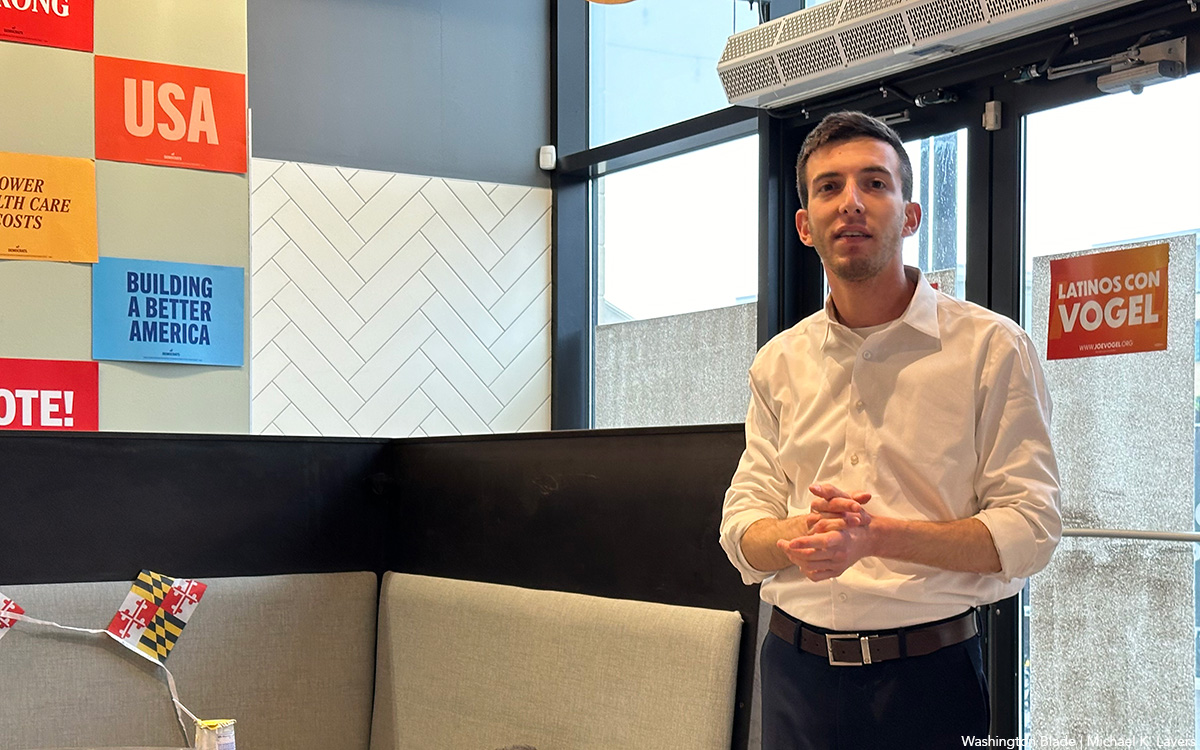
GAITHERSBURG, Md. — Maryland state Del. Joe Vogel (D-Montgomery County) on Friday held a “Big Gay Canvass Kickoff” event at his congressional campaign’s headquarters.
LGBTQ+ Victory Fund Vice President of Outreach and Engagement Marty Rouse and John Klenert, a member of the DC Vote and Victory Fund Campaign board of directors, are among those who participated alongside members of Equality PAC. Vogel spoke before Rouse, Klenert and others canvassed for votes in the area.
“Joe brings a fresh new perspective to politics,” said Gabri Kurtzer-Ellenbogen, deputy field director for Vogel’s campaign.
Vogel, 27, is among the Democrats running for Congressman David Trone’s seat.
Trone last May announced his bid to succeed retiring U.S. Sen. Ben Cardin (D-Md.) in the U.S. Senate.
The Democratic primary is on May 14. Vogel would be the first Latino, the first gay man and first Gen Zer elected to Congress from Maryland if he were to win in November.
“We need a new generation of leadership with new perspectives, new ideas, and the courage to actually deliver for our communities if we want things to get better in this country,” Vogel told the Washington Blade last month during an interview in D.C.
-

 South America3 days ago
South America3 days agoDaniel Zamudio murderer’s parole request denied
-

 Maryland4 days ago
Maryland4 days agoMontgomery County police chief discusses arrest of trans student charged with planned school shooting
-

 Politics5 days ago
Politics5 days agoCourt records raise concerns about right-wing TikTok investor’s influence
-

 Commentary4 days ago
Commentary4 days agoWorld ‘isn’t much different today’










